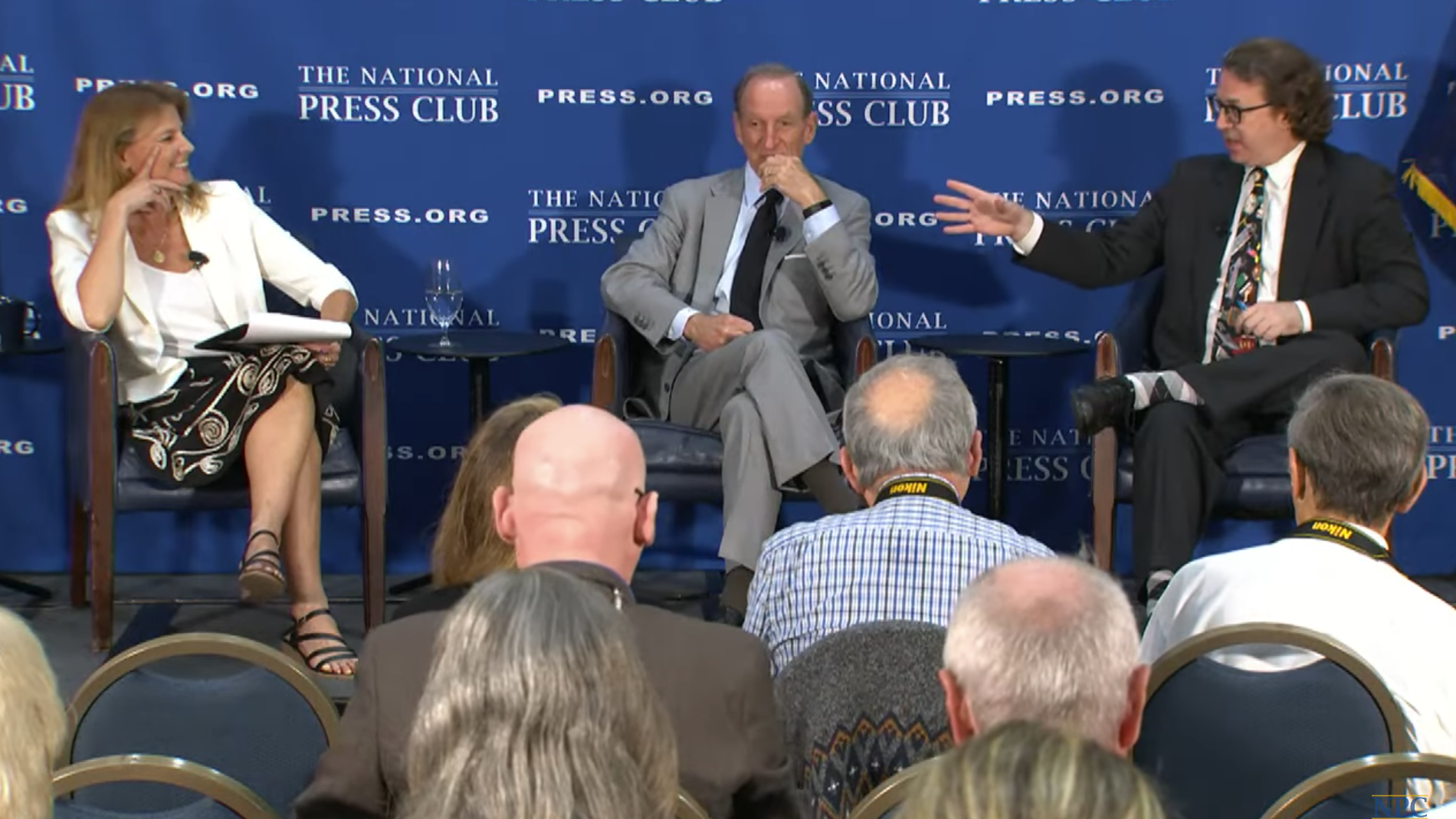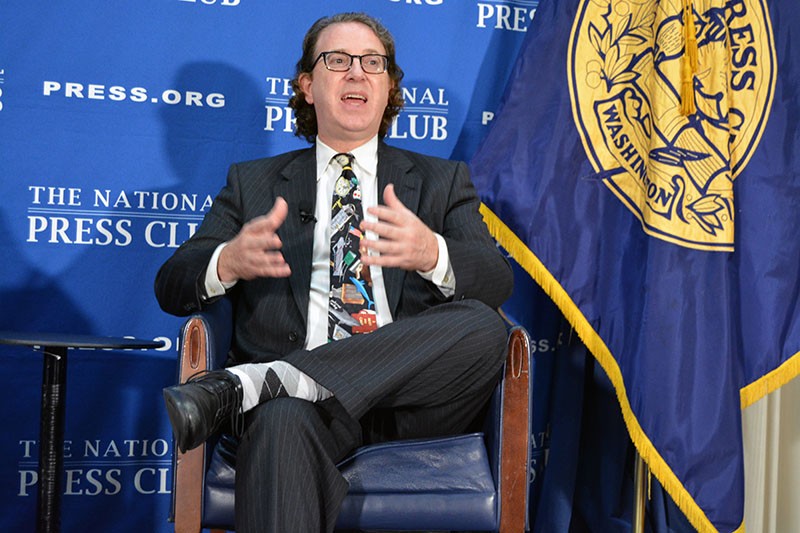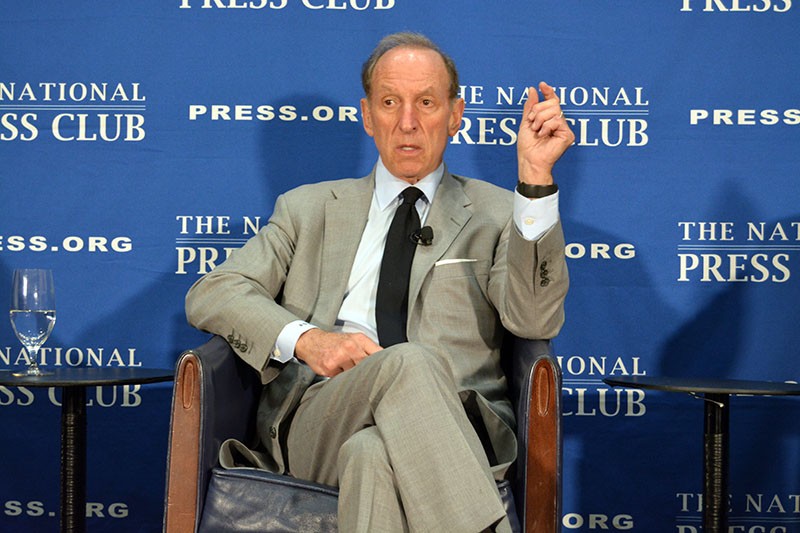Espionage Act experts warn journalists of looming prosecutions
Ominous new dangers threaten reporters, who could face Espionage Act prosecutions by the Trump administration that may well result in their serving actual jail time, legal experts said at a July 1 National Press Club Headliners Cocktails & Conversation event.
Lawyers Abbe Lowell and Mark Zaid told the Club audience that reporters should consider keeping their bylines off stories that rely on sensitive leaked information to slow down possible probes around leaks. They also discussed the April memo from Attorney General Pam Bondi that was widely viewed as a weapon to employ against journalists.

Bondi’s memo effectively ended guidelines that were intended to limit when and how Justice Department lawyers would chase down reporters for reporting on ‘leaked’ government information. This has sent a chill down the spine of news organizations, according to Tara Copp, the Associated Press Pentagon and national security reporter who moderated the event.
“The Espionage Act may be used even more aggressively now,” she said.
Lowell suggested that reporters should take immediate steps to protect themselves from the new regime by better “calibrating” news gathering tactics, getting editors more engaged and - conveniently for lawyers who do this work – “get attorneys involved earlier in the process.”
Lowell added: "We need to have publishers who understand the peril we are in and are willing to make the fight,” referring to the expense of defending their reporting staff in court.
Trump administration aggression
Zaid said that while many administrations have gone after news organizations for reporting things they don’t like, the actions of the Trump administration are far more egregious.
“The writing is on the wall… journalists are going to be charged under the espionage act by this administration,” Zaid said, noting that Trump has been very vocal about threatening journalists -- including as recently as this week when he and Department of Homeland Security Secretary Kristi Noem took turns bashing CNN.
“We’re working with the Department of Justice to see if we can prosecute them for that," Noem said, referring to a CNN story alerting viewers to an app that can help them track ICE agents, presumably to avoid detection or arrest.

Trump is angry about the way CNN and other news organizations have characterized the effectiveness of the military strikes he ordered against Iran; some of those stories have relied on government assessments shared with journalists.
Both Lowell and Zaid touched on the use of the non-government approved messaging app called Signal to share information about military strikes back in March; that info was also shared accidentally with Atlantic editor Jeffrey Goldberg, a clear breach of operational security.
Defense Secretary Pete Hegseth, who was part of the embarrassing Signal leak, “still hasn't been held accountable for the Signal chat that included a reporter,” Zaid said. Lowell joked that Hegseth “wasn’t bright enough to know you could make them disappear in an hour.”
Copp also noted that the Pentagon is reviewing new policies to impose on reporters who want a ‘hard pass,’ a type of ID that allows for less time-consuming entry into the building.
But the new rules may simply be a way to prosecute leaked information more easily by government lawyers.
“They might create a contractual agreement - and then sue you for breach of contract and sue for damages,” Zaid said.
Tech increases reach of Espionage Act
The history of the Espionage Act goes back to World War I. It was intended to make sure government secrets did not go to U.S. “enemies” but has not been updated since 1950 despite enormous changes in technology.
Zaid noted that years ago it was hard to catch leakers. Now it’s much easier with texts and emails, and the most significant escalation in the war against journalists using the Espionage Act was during the administration of President Barack Obama, Lowell said.

Lowell said that of the nine Supreme Court members, “only two or three think the First Amendment was a bad idea” but that it still leaves a majority who would be unlikely to completely toss protections for journalists.
Lowell also compared Zaid to the U.S. Constitution, telling him he was the “5th Protection” after the separation of powers and 4th estate protections of the Bill of Rights, presumably because of his work on behalf of reporters.
At the end of the discussion, Copp told Lowell and Zaid: “Thank you for all you are doing to protect journalists and help them do their jobs.” The remark received sustained applause.
